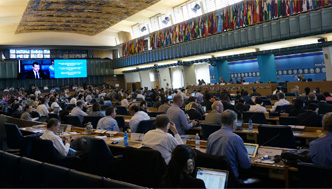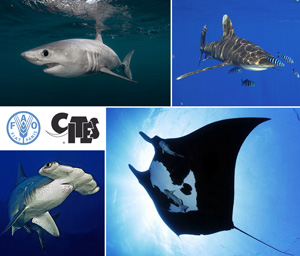Update on FAO-CITES activities related to commercially-exploited aquatic species
John E. Scanlon, Secretary-General,
Convention on International Trade in Endangered Species of Wild Fauna and Flora (CITES)
9-13 June 2014, Rome, Italy
Chair, Johan H. Williams
Committee delegates
Colleagues
Thank you for giving us the opportunity to briefly address this Agenda Item on the results of the Fourteenth Session of the FAO COFI Sub-Committee on Fish Trade.
------
 When I last addressed you at your 29th session in early 2011, I observed that FAO and CITES had entered a new era of cooperation and I committed to further enhancing our collaborative relationship.
When I last addressed you at your 29th session in early 2011, I observed that FAO and CITES had entered a new era of cooperation and I committed to further enhancing our collaborative relationship.
Three years later, I am delighted to report that this objective has indeed been achieved.
The 180 Parties to CITES greatly appreciate the FAO expert advice on proposals to list commercially exploited aquatic species in the CITES Appendices.
At our 16th meeting of the Conference of the Parties held in Bangkok in March last year, CITES Parties decided to regulate international trade in five shark species and all manta rays through an Appendix II listing.
Inclusion of species in CITES Appendix II means that products of such species can enter international commercial trade on condition that they were legally obtained, their trade is biologically sustainable and such trade is traceable through the CITES permitting and reporting system.
As with all new listings there will be some implementation challenges. These listings do, however, present some special features and, as such, the entry into effect was delayed by 18 months to 14 September of this year to give Parties adequate time to be prepared.
-----
Distinguished delegates, the effective implementation of these new listings will serve to achieve both CITES and FAO objectives and to that end the CITES and FAO Secretariats are working well together, and in a very pragmatic manner, in the interest of our respective members.
The CITES Secretariat received, with gratitude, Euro 1.2m in funding from the European Union to support these new sharks and manta ray listings
Last July, I met FAO Assistant Director General Árni Mathiesen and we agreed to work together on providing this support to identified States and regions. Since our meeting, we have provided part of these funds to FAO - and consultants recommended by FAO - to support CITES Parties with implementation of the shark listings and to help bring the fisheries and CITES sectors closer together in key shark fishing and trading nations, where coordinated work may not yet be underway.
 We have held joint workshops in Morocco – for key African States, and China – for key Asian States, to assess practical needs and we will now be working together to assist States directly in this regard.
We have held joint workshops in Morocco – for key African States, and China – for key Asian States, to assess practical needs and we will now be working together to assist States directly in this regard.
Both the Latin America and Caribbean and Oceania regions already held their own workshops, hosted by Brazil and Australia respectively, to assess their readiness to implement the new listings and FAO and CITES will be supporting the follow-up activities they agreed.
Other States and civil society organizations are also holding a series of workshops, including events to be held in El Salvador, Fiji, India, Thailand, the United Arab Emirates and Yemen.
We are also building bridges with Regional Fisheries Management Organizations (RFMOs) that often play a vital role in fisheries management and we addressed the 5th meeting of the Regional Fishery Bodies Secretariats' Network on this matter last Saturday. We were most encouraged by their interest and aim to build on this relationship in the future, noting CITES does not substitute for RFMOs. It is a complementary measure that can support RFMOs.
Distinguished delegates, there is a worldwide collective effort underway to help States implement the shark and ray listings agreed at CITES CoP16, which is most encouraging.
-----
In relation to document COFI/2014/6 on the results of the COFI-FT meeting, we respectfully call on FAO members to:
- put the FAO Expert Advisory Panel for CITES amendment proposals on a firm financial and organizational footing – it is highly valued by our respective member States;
- ensure that the FAO Secretariat has a clear focal point for CITES co-operation in order to maintain the excellent cooperative relationship that has been built up; and
- encourage continued and additional cooperation between national fisheries and CITES authorities for the mutual benefit of both
There is still much to do to ensure that international trade in certain shark species can be conducted legally, sustainably and traceably, but it is most definitely worth the effort and it serves the interests of both FAO and CITES.
Our mutual success will contribute to the survival of these species and the ability of future generations of fishers to benefit from these resources in a sustainable manner.
Distinguished delegates, we believe that cooperation is the way forward and we thank FAO warmly for its efforts in this regard.
I wish you well for the rest of your meeting.